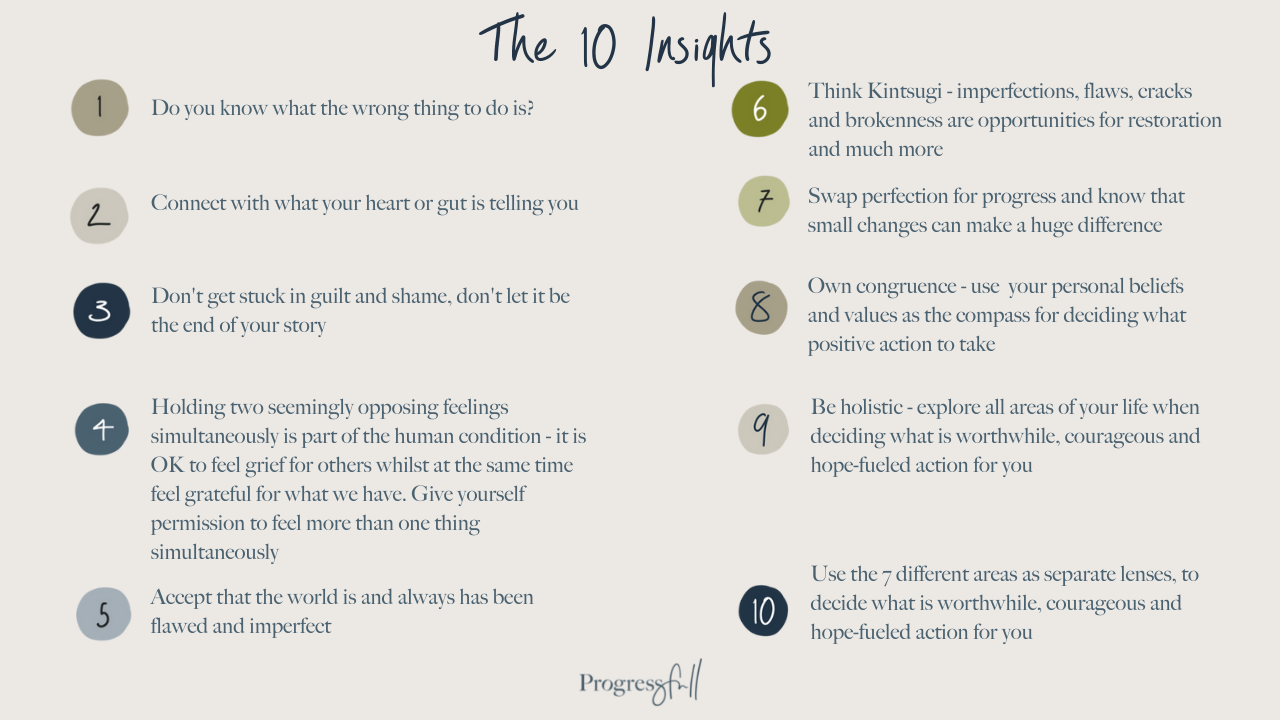What is a worthwhile, courageous & hope-fueled response to unimaginable suffering?

A lot of us are struggling with what is happening in the world right now
Both mainstream and social media are full of harrowing stories and images of physical and emotional pain, and destruction on apocalyptic levels. For a lot of us it feels almost impossible to work out our response without feeling futile, fearful and frankly hopeless
What is a worthwhile, courageous and hope-fueled response to so much unimaginable suffering?
In the face of suffering and destruction, our natural instinct is to work out what needs to be done to make the suffering stop. Sometimes there is an obvious thing we can personally do, for example, to share our resources with people who need them more than we do to survive the tragic circumstances they find themselves in, or to repair and rescue things which have been destroyed or are at risk of extinction
Yet should we do more than this?
For example, does it genuinely support others by posting things on social media? These are sometimes complex situations which in truth, a lot of us may not know much about. Or is this just virtue signaling and empty gestures? Does this show people we care in a way which persuades them to take action too, the type of action which actually changes the terrible situation for the better? Or is this doing an easy thing to make ourselves feel better so we feel less guilty about getting on with our normal lives?
Should we be swapping sound bites on social media for storming parliament, changing our daily habits - where we shop, what we eat, what we do with our spare time and money - even our jobs?
This is exactly the conversation which we have been having at Progressfull and probably most of you around dinner tables and work tables have been having it too. Something you may not be aware of about Jo (co-founder and Progressfull Insight) is that she often has a different and at times enlightened perspective on how to deal with the complex and profound. Connecting the dots in a way which is practical, simple and straight forward. In our recent discussions about the unimaginable suffering today Jo shared with me the tips and insights she uses when feeling futile, fearful and frankly hopeless, and in doing so, changes her approach to create a worthwhile, courageous and hope-fueled response. We want to share the 10 insights with you and hope you find them as useful and valuable as I do. Several of them you may be applying today in your life already, but if you are like me, there will be several that you won't

A lot of people find it hard, very hard, to work out the right thing to do, yet many of us in our gut, do know what the wrong thing to do feels like. This is the first insight - do you know what the wrong thing to do is? Making decisions based on society's expectation of what we should do feels wrong, deep down we know this, it doesn’t feel quite right – it feels a bit like peer pressure. A bit like when we don’t defend the new guy in the playground who is getting bullied by the older kids for fear of what will happen to us, if we speak out. We know he doesn’t deserve it; he’s just moved from a different school so he’s an easy target because he doesn’t know anyone, he’s on his own. Yet we know the bullies could turn on us or our friends one day, so we walk on by, safely surrounded by our peers, heads down
This is one of the reasons why everyone is feeling uncomfortable right now – a lot of what we do in response to crisis in other people’s lives can either feel like walking by, or feel like virtue signaling and empty gestures - the equivalent of waving coloured flags and clapping our hands to show our appreciation, then turning our backs and getting on with our lives
We know it when we see it and we don’t want to be part of it – so we do nothing – which feels even worse

When things are not sitting comfortably inside us, that is a sign that our heart or our gut is telling us there is something out of kilter. This is the second insight - connect with what your heart or gut is telling you. Often, we are not actively deciding what we personally want to do, we are in reality a passenger, following someone else's lead, a bit like sheep. And useful for you to know the times when we don’t actively decide what we personally want to do, is what creates our feelings of shame, guilt, and discomfort. So, a lot of us are feeling very uncomfortable right now – we are feeling shame, guilt and discomfort about going on with our own life whilst so many other lives are under threat, and if we are honest, we are feeling judged for not showing we care
I know this is very, very uncomfortable because I have felt shame, guilt and discomfort too

Feeling shame and guilt can paralyse us – it saps our energy, holds us back, and most tragically can get in the way of us taking positive action - worthwhile, courageous and hope-fueled action. This is the next insight: don't get stuck in guilt and shame, don't let it be the end of your story

Having these very unsettling feelings is actually very normal – they are siblings of survivors' guilt. Feeling guilty can be a sign of empathy for others in our world and feeling a sense of hopelessness is also normal when we consider the death and destruction happening all around us in the world. What is helpful to hold onto at times like these, is that it is OK to feel grief for others whilst at the same time feel grateful for what we have. As the illustrator Mari Andrew says,
“Someone has always clinked a cocktail glass in one hemisphere as someone loses a home in another whilst someone falls in love in the same apartment building where someone grieves. The fact that suffering, mundanity and beauty coincide is unbearable and remarkable"
This is the fourth insight: Holding two seemingly opposing feelings simultaneously is part of the human condition - it is OK to feel grief for others whilst at the same time feel grateful for what we have. Give yourself permission to feel more than one thing simultaneously

The world is and always has been flawed and imperfect. That is the world we inhabit. War, racism, gender inequality, slavery, climate change, pandemics – all exist, and have existed for some while. It is imperative that we strive to eradicate every injustice we see in the world, yet it is also imperative that we realise that there will always be a new injustice just around the corner, there will always be a new threat just around the corner, there will always be a new disaster just around the corner. This is the flawed and imperfect world we inhabit. People are committing atrocities, forest fires and floods are devastating and destroying, innocent people are dying. It is tragic. It is cruel. There is no denying, as humans, we can behave in a despicable way. This is the truth, a truth which is shocking and uncomfortable. The fifth insight is to accept that the world is and always has been flawed and imperfect
Yearning for a world in which death and despair do not happen is not real. Holding onto this sugar-coated, shiny Disney dream holds us back, which tragically, condemns us to not making the real progress we are all capable of
One of the hardest things about being a human being is accepting this truth – that both death and despair and also glory and beauty exist in our world at the same time. The world is not perfect, it is imperfect and longing for a perfect world in which death and despair do not exist is at best naïve and at worst futile

At Progressfull, we have created an analogy or metaphor to explain the concept of living well in a world that is flawed and imperfect. The concept applies equally to ourselves as we are all flawed and imperfect human beings. We find it very helpful for us to keep front of mind when thinking about how to deal with the difficulty of living in a flawed and imperfect world. It relates to a Japanese practice or art called Kintsugi. Kintsugi started in the 15th century, and is where the artist celebrates flaws or imperfections in broken pottery by using gold to repair and illuminate the breaks, knocks and imperfections
If we can swap a yearning for a perfect world in which flaws and imperfections, death and despair do not exist - and look for how we can restore and reinvigorate our world - our world can be refreshed with hope, it can be revitalised, just like the pottery
What Kintsugi does is revitalise the pottery with new life. It makes the pottery immensely valuable, even priceless, and the object’s beauty is enhanced as a result. For us then, instead of feeling helpless and guilty when faced with the imperfect nature, the darkness in our world, we can use our reaction to that darkness to help us make progress, help us decide what small action we can take that is worthwhile, courageous and hope-fueled. This is the sixth insight: Think Kintsugi - imperfections, flaws, cracks and brokenness are opportunities for restoration and much more

Swapping the unreal concept of a perfect world for a world of progress means we aim for progress, not perfection. Even the smallest steps of progress move us forwards, they are the small glints of gold in the pottery where the cracks once were. Small steps of progress spark confidence and hope. With each new step we see we are taking positive action that is worthwhile, courageous and hope-fueled
This is what we call Being Progressfull – by swapping perfection for progress we start to let go of our wonkiness, our feelings of anxiety and stress, so we can focus our time and energy on the best small steps forwards, living a life which is fully integrated, wholesome and genuine. Living a life which is our best life for ourselves and others, spending our lives doing the things which we can genuinely do to make a positive difference in the world – achieving our own and our world’s potential. Swapping perfection for progress and knowing that small changes can make a huge difference is insight seven. That is why Kintsugi is so powerful as an analogy for us
So how do we do that then, how do we decide what positive action, what small steps we can take to achieve progress?

The way we decide what is worthwhile, courageous and hope-fueled action is by searching inside ourselves. What rings true to us, what is a worthwhile step for us, what is a courageous step for us, what is a hope-fueled step for us, which is not society or our peers deciding what steps we should take. It is not about platitudes on social media and is not about following society's norms like sheep. We search inside ourselves, we consider our own personal beliefs and values, and we act from a position of congruence
Owning Congruence is about being in the driving seat of our own life, consistently living a life of harmony between our internal and external worlds – the things we believe in and the way we behave, the actions we take. Owning Congruence will address the out of kilter unsettling feelings from our heart and gut, and deal with our feelings of shame, guilt and discomfort. We will then not be living our lives in accordance with what social media thinks we should do or living our lives doing what our friends and family say we should do. We will be acting according to our own beliefs, our own values, our own guiding principles which help us understand what is worthwhile, courageous and hope-fueled action for us
This is the eighth insight: Own congruence - use your personal beliefs and values as the compass for deciding what positive action to take

At Progressfull, we believe the best life to lead is one whole life, a life which is fully integrated, fully holistic. To be fully holistic involves us acting in accordance with our own beliefs and values by exploring all areas of our life and deciding what is worthwhile, courageous and hope-fueled action for us. This is the ninth insight: Be holistic - explore all areas of your life when deciding what is worthwhile, courageous and hope-fueled action for you

At Progressfull we break life down into 7 different areas: 1. home life 2. friends and family 3. work life 4. health and wellbeing 5. money 6. social and personal impact 7. hobbies, holidays and leisure time. These 7 areas make up our holistic, whole, one-life. When we are congruent all these areas are fully integrated, aligned in harmony, we are truly congruent. When the areas are not aligned, when they are are at odds, this is when we are out of kilter and lacking congruence
We encourage you to look at world changing events through the lens of being congruent
Using these 7 different areas as separate lenses, where you consistently and deliberately decide what is worthwhile, courageous and hope-fueled action for you. So for example, when I look at the crisis in the Ukraine, how do I want it to influence what I am doing with my home life, with my family? How do I want it to influence what I am doing with my money, with my work, with my social and personal impact, with my hobbies, holidays and leisure time? The tenth insight is: Use the 7 different areas as separate lenses, to decide what is worthwhile, courageous and hope-fueled action for you
It’s important to note – we are not telling you what to do here, we are not saying that you look at an event and take action in each of the 7 areas. What we are saying is that you make your decisions about what you want to do about a world changing event, a crisis in our world, how you want to help make progress, how you want to change the situation for the better – based on your own unique perspective, your own values and beliefs. Consider and explore all 7 areas of your life to help you draw conclusions about what is worthwhile, courageous and hope-fueled action for you to take - as a small step of progress that will help add some gold to mend one of the cracks
Then you will be making a decision about what to do based on your own values, your own beliefs and your own unique perspective on the world – so you will be better able to cope with world changing events because you will feel more in control of your own responses – rather than being cajoled, pressurised, judged, guilt-tripped or shamed into taking action
Using these 10 insights helps us respond better to unimaginable suffering and take positive action that is worthwhile, courageous and hope-fueled. Using these 10 insights helps you make your own contribution, your own progress in a more holistic way and integrate every part of your life. Taking small steps of progress sparking confidence and hope with each new step
This is an extract from our Owning Congruence Upskill (course/masterclass) which we thought might be helpful for you. You can discover more about our Owning Congruence Upskill here

Note: When we set up Progressfull, it was important to us that we give a larger proportion of our business profit to charitable causes than most businesses give. On average businesses which give to charity donate 1% of their profit. So, we decided for us, given the values we want to live as Progressfull, the right thing for us is to give 10% of our profit to charitable causes. We also decided that the charities would be ones which empower people and that we ask our clients to choose which charity we donate to. Because of the situation in the Ukraine today we have decided to give 100% of our charitable contribution this year to support Ukraine
(If you want to know more about our values have a read of our manifesto)




